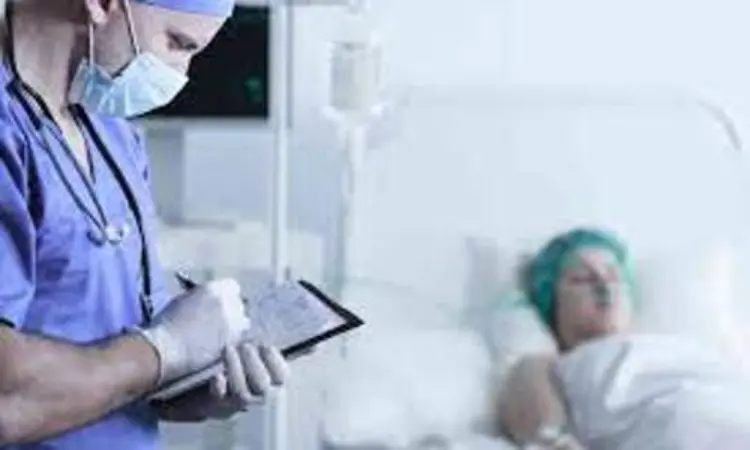- Home
- Medical news & Guidelines
- Anesthesiology
- Cardiology and CTVS
- Critical Care
- Dentistry
- Dermatology
- Diabetes and Endocrinology
- ENT
- Gastroenterology
- Medicine
- Nephrology
- Neurology
- Obstretics-Gynaecology
- Oncology
- Ophthalmology
- Orthopaedics
- Pediatrics-Neonatology
- Psychiatry
- Pulmonology
- Radiology
- Surgery
- Urology
- Laboratory Medicine
- Diet
- Nursing
- Paramedical
- Physiotherapy
- Health news
- Fact Check
- Bone Health Fact Check
- Brain Health Fact Check
- Cancer Related Fact Check
- Child Care Fact Check
- Dental and oral health fact check
- Diabetes and metabolic health fact check
- Diet and Nutrition Fact Check
- Eye and ENT Care Fact Check
- Fitness fact check
- Gut health fact check
- Heart health fact check
- Kidney health fact check
- Medical education fact check
- Men's health fact check
- Respiratory fact check
- Skin and hair care fact check
- Vaccine and Immunization fact check
- Women's health fact check
- AYUSH
- State News
- Andaman and Nicobar Islands
- Andhra Pradesh
- Arunachal Pradesh
- Assam
- Bihar
- Chandigarh
- Chattisgarh
- Dadra and Nagar Haveli
- Daman and Diu
- Delhi
- Goa
- Gujarat
- Haryana
- Himachal Pradesh
- Jammu & Kashmir
- Jharkhand
- Karnataka
- Kerala
- Ladakh
- Lakshadweep
- Madhya Pradesh
- Maharashtra
- Manipur
- Meghalaya
- Mizoram
- Nagaland
- Odisha
- Puducherry
- Punjab
- Rajasthan
- Sikkim
- Tamil Nadu
- Telangana
- Tripura
- Uttar Pradesh
- Uttrakhand
- West Bengal
- Medical Education
- Industry
How postoperative shivering is affected by time of paracetamol administration during surgery?

Recently published study compared the incidence of postoperative shivering in patients receiving intravenous paracetamol (PCM) at different times. Postoperative shivering can result from an increased core body temperature set point, and IV PCM has been shown to reduce this by inhibiting prostaglandins to decrease the hypothalamic temperature set point. The trial involved 225 ASA I/II adult patients undergoing elective surgeries under general anesthesia (GA), where the patients were grouped to receive PCM immediately after anesthesia induction, 30 minutes before completion of surgery, or no PCM. The study found that administering PCM 30 minutes before completion of surgery resulted in the lowest incidence of postoperative shivering and hypothermia, as well as a longer time to analgesic requirement, compared to PCM administration after anesthesia induction or no PCM. The study also discussed the mechanism of PCM in preventing shivering and reducing post-surgical stress. Furthermore, the researchers highlighted that the peak hypothermic action of PCM is about 120 minutes. The study concluded that administering PCM close to the end of surgery maximizes its benefits in preventing shivering and providing good postoperative analgesia. The results also supported the practice of administering PCM as part of multimodal analgesia during surgery. However, the study had limitations related to the duration of procedures and ambient operating room temperatures.
Reference-
Mohta, Medha; Mounika, T. Bindu; Tyagi, Asha. Effect of timing of intraoperative administration of paracetamol on postoperative shivering: A randomised double-blind controlled trial. Indian Journal of Anaesthesia 67(12):p 1071-1076, December 2023. | DOI: 10.4103/ija.ija_720_23
MBBS, MD (Anaesthesiology), FNB (Cardiac Anaesthesiology)
Dr Monish Raut is a practicing Cardiac Anesthesiologist. He completed his MBBS at Government Medical College, Nagpur, and pursued his MD in Anesthesiology at BJ Medical College, Pune. Further specializing in Cardiac Anesthesiology, Dr Raut earned his FNB in Cardiac Anesthesiology from Sir Ganga Ram Hospital, Delhi.
Dr Kamal Kant Kohli-MBBS, DTCD- a chest specialist with more than 30 years of practice and a flair for writing clinical articles, Dr Kamal Kant Kohli joined Medical Dialogues as a Chief Editor of Medical News. Besides writing articles, as an editor, he proofreads and verifies all the medical content published on Medical Dialogues including those coming from journals, studies,medical conferences,guidelines etc. Email: drkohli@medicaldialogues.in. Contact no. 011-43720751


